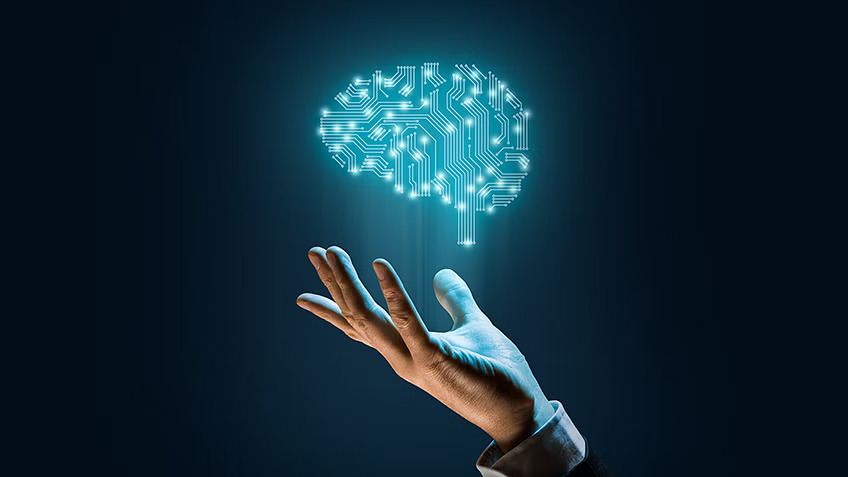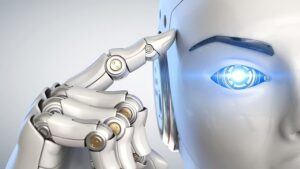The media bombards us with articles about how artificial intelligence (AI) and machine learning (ML) are rising and will soon find their way into every part of our lives. AI and ML are disruptive technologies that change the status quo significantly, typically changing how people and organizations do business. For example, email is a disruptive technology since it’s changed how people send mail.
Disruptive technologies usually change the employment landscape. This change usually means that some jobs or professions go away or at least the demand for them plummets. However, it also means that new jobs are created and must be filled. Since AI and ML are changing today’s society, including making some jobs obsolete, it would be wise to learn how to become a machine learning engineer. After all, if you can’t beat them, join them, right?
This article explores becoming a machine learning engineer, including defining the role, why you should learn it, what they do, and the requirements needed.
Let’s define machine learning first.
What is Machine Learning?
Machine learning is defined as a branch of computer science and artificial intelligence that creates systems that analyze pre-existing data and learn patterns. Machine learning makes decisions, classifications, predictions, or other tasks based on similar data but with minimal human intervention.
For instance, people learn from past experiences to make better future decisions. Likewise, machine learning trains a computer to learn from historical data to perform future tasks better.
Although machine learning and traditional programming are similar, there are some profound differences. In conventional programming, people feed data into computers and develop programs to change the data into needed output. Computer programming is a highly human-involved process, limited by our capabilities of defining and structuring data.
But with machine learning, ML engineers feed data into the machine and, based on what information has already been entered, it develops its logic depending on the desired output. So, with machine learning, computers learn without people having to do anything. Machine learning is not achieved by programming; instead, it’s taught with data.
Also Read: Are Machine Learning and Data Science the Same?
So, What’s a Machine Learning Engineer?
Machine learning engineers are exceptional programmers who design software that can learn from data and create forecasts and predictions. ML engineers also develop algorithms that solve problems and develop computer science and engineering solutions.
Machine learning engineers are like software engineers by profession and lie in the conjunction of software engineers and data scientists. However, ML engineers go beyond programming machines; they are responsible for implementing and optimizing machine learning algorithms from start to finish. The ML engineer’s final output is a functioning software product rather than the visualizations or analytical insights made along the way. The beneficiaries of this output are other software pieces that can run with little to no human intervention. So, an ML engineer handles the theoretical data science models and scales them up for production levels, enabling them to handle a substantial amount of real-time data.
Before we look at how to become an ML engineer, let’s look at precisely what they do.
What Do They Do? Machine Learning Engineer Roles and Responsibilities
Machine learning engineers typically perform the following tasks, although the exact number can vary depending on the organization’s size and AI/ML staff.
- Automate feature model training, engineering, and evaluation process
- Build machine learning models, implementing designs into the code
- Communicate and explain complex processes to non-technical people
- Design machine learning algorithms
- Develop web services or APIs for serving model outcomes for internal teams, stakeholders, or users
- Enrich and expand machine learning frameworks and libraries
- Implement machine learning and statistical analysis into highly accessible, high-performance production-level systems to create ease of access for users
- Research and implement best practices to improve existing machine learning infrastructures
- Test and maintain machine learning algorithms
- Train and re-train machine learning systems when needed
- Translate machine learning models as data scientists define from environments such as Python and R notebooks into analytic applications
- Take the lead in software engineering and software design projects
Also Read: Machinе Lеarning Algorithms: A Beginner’s Guidе
Why Consider Becoming a Machine Learning Engineer?
Machine learning and artificial intelligence are rapidly growing fields with a high demand for trained professionals. As more tasks get turned over to AI and ML, there will be a corresponding increase in demand for people to design and maintain these systems. Critics say that these new technologies will displace millions of workers. Though that’s possible, the naysayers fail to account for the millions of new jobs these emerging technologies will create.
Of course, these fields require training, so it’s wise to learn how to become a machine learning engineer, get ML training, and learn the skills needed to succeed in this exciting new field.
What Makes an Ideal Machine Learning Engineer?
By now, you must be curious about the characteristics of a sound machine learning engineer. So here’s what a machine learning engineer should know.
- How to Write Clean Code. Good machine learning engineers write clean code, which is necessary for developing algorithms to make sense of data and develop predictive models.
- How to Understand Software Development Methodologies. Good machine learning engineers have a solid understanding of software development methodologies and different architectures and are familiar with other integrated development environments (IDEs). This understanding is the foundation of their ability to build, test, and maintain large-scale software architectures.
- Many Programming Languages. Machine learning engineers must have a broad knowledge of languages such as Python, R, Java, C++, JavaScript, and others. Additionally, they must know about algorithms such as linear regression and support vector machines. This knowledge helps machine learning engineers learn new skill sets quickly, work with multiple simultaneous data sets, and process vast quantities of data.
- How to Think in Sound Algorithms. Good machine learning engineers can think about a problem holistically and design a model to solve it. Furthermore, they must be able to think about the level of accuracy needed for the model they’re building and the average amount of time required to make it.
- Strong Theoretical Foundations in Mathematics, Statistics, and Computer Science. Theoretical knowledge is essential for machine learning engineers to design versatile, practical models that can be used in many domains, like computer vision, natural language processing (NLP), and speech recognition. Additionally, machine learning engineers need a solid theoretical foundation in computer science, mathematics, and statistics. Finally, knowledge of probability theory, linear algebra, and calculus helps engineers execute machine learning functions like:
- Big data analysis
- Data mining
- Information retrieval
- Natural language processing
- Neural networks
- Predictive analytics
- Recommendation engines
- Search algorithms
- Statistical analyses
- Support vector machines
Also Read: AI in Marketing: Here’s What You Need to Know
Machine Learning Engineer vs. Data Scientist
The following chart compares machine learning engineers and data scientists, considering how similar both professions are.
| Data Scientist | Machine Learning Engineer | |
| Job Type | Exploratory | Experimental |
| Job Role | Work with complex real-world data to create actionable insights and apply machine learning to build data products. | Use different machine learning models to forecast and make predictions based on historical data. |
| Required Skills | Big data platforms, data cleaning, data visualization, machine learning, programming languages, and statistical skills. | Computer vision, deep learning, supervised and unsupervised ML algorithms, natural language processing (NLP), and knowledge of Python, Tensorflow, Keras, PyTorch, etc. Also, algorithm deployment, APIs, basic math data wrangling, model version control, scaling on the cloud, and statistics. |
| Largest Challenge | Handling situations where data isn’t available. | Dealing with the complexity and scalability of algorithms. |
What Other Positions Can a Machine Learning Engineer Handle?
Here’s a list of professions that machine learning engineers can handle.
- Lead machine learning engineer
- Machine learning engineer
- Machine learning software engineer
- Machine learning research scientist
- Principal machine learning engineer
- Senior machine learning engineer
- Data scientist positions
Now, let’s cover the steps for how to become a machine learning engineer.
Also Read: What is a Confusion Matrix?
The Steps Needed for Becoming a Machine Learning Engineer
Here are the steps you should take in your quest to become a machine learning engineer.
Get your Education
Educational requirements vary depending on the company or organization. For example, some companies want applicants with an undergraduate degree in computer science, mathematics, or engineering or at least two years of work experience. Yet other companies don’t need any specific educational background but prefer candidates with some experience in data science, statistics, machine learning, and artificial intelligence. But at the very least, you should have a computer science, statistics, or mathematics degree.
Learn Programming Languages
If you haven’t learned these languages in school, learn one or more of the following:
- C++
- Linux
- Python
- R
- Java
- JavaScript
- Shell
Develop the Required Skills
Here are the skills you should lock down.
- Computer science fundamentals
- Data processing, modeling, and evaluation
- Probability and statistics
- System design
Construct Your Machine Learning Portfolio
Create a solid machine learning portfolio consisting of successful ML projects you have completed. This resource shows recruiters you know what you’re doing and have hands-on experience.
Consider an Internship
While not mandatory, an internship gives you the necessary experience and helps you build contacts in the field.
Earn a Certificate
You can take an online ML certification course or bootcamp if you have any knowledge or skill gaps. You will gain the valuable ML knowledge and skills you need, plus a certificate that shows recruiters that you’re proficient in the necessary skills.
Gain More Work Experience
Even if you’re not a machine learning engineer, you could gain skills and knowledge by helping your organization’s current ML engineers with ongoing projects. You will gain valuable training and work experience courtesy of your associates, and, like an internship, it can help you get contacts.
Apply for a Position
Now that you have the skills and experience schedule the interview and get that job!
Do You Want a Career in AI and ML?
Now that you have some guidance on how to become a machine learning engineer and are intrigued by a career in this field, you need the proper training and skills. We mentioned earning a certificate to get that valuable knowledge, and this AI ML bootcamp will help you get those skills you need and earn a valuable certificate.
In this bootcamp, you will get training to become an AI/ML professional in six months. The bootcamp provides a high-engagement learning experience covering computer vision, deep learning, neural networks, natural language processing (NLP), machine learning, speech recognition, reinforcement learning, and more.
You might also like to read:
What is Artificial Intelligence? A Comprehensive Guide for Beginners
All About Artificial Intelligence Skills
Are the Sciences of Artificial Intelligence and Machine Learning the Same Thing?






